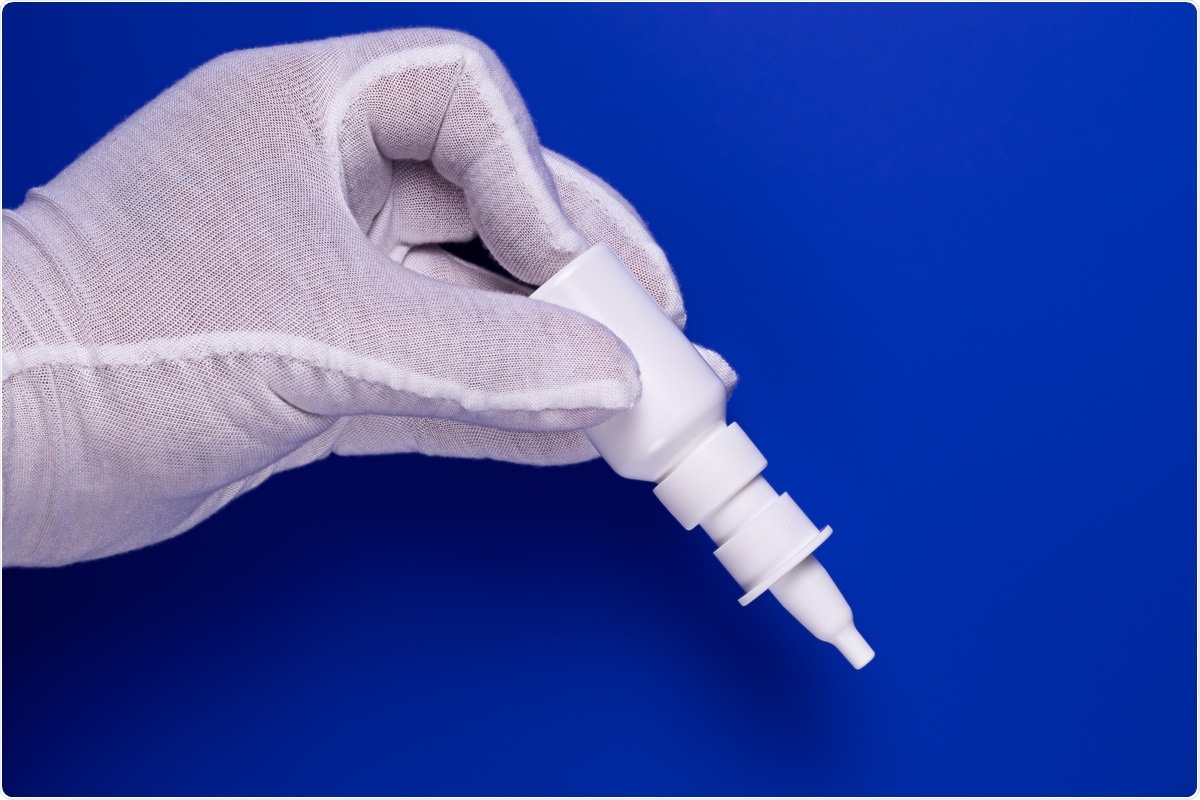The coronavirus disease 2019 (COVID-19) pandemic continues to rage in many countries over a year after it first emerged in Wuhan, China. New and more infectious severe acute respiratory syndrome coronavirus 2 (SARS-CoV-2) variants are emerging, with concern mounting over their natural and vaccine-induced immunity evasion potential.
Rapid development and deployment of non-invasive therapeutic measures to prevent infection by all SARS-CoV-2 variants could complement the currently ongoing vaccination efforts. It will also help put an end to this unprecedented COVID-19 pandemic.

Study: An intranasal ASO therapeutic targeting SARS-CoV-2. Image Credit: strannik65 / Shutterstock
Novel intranasal therapeutic option to target SARS-CoV-2 RNA using antisense oligonucleotides

 This news article was a review of a preliminary scientific report that had not undergone peer-review at the time of publication. Since its initial publication, the scientific report has now been peer reviewed and accepted for publication in a Scientific Journal. Links to the preliminary and peer-reviewed reports are available in the Sources section at the bottom of this article. View Sources
This news article was a review of a preliminary scientific report that had not undergone peer-review at the time of publication. Since its initial publication, the scientific report has now been peer reviewed and accepted for publication in a Scientific Journal. Links to the preliminary and peer-reviewed reports are available in the Sources section at the bottom of this article. View Sources
Researchers from the US and Denmark recently described a novel therapeutic option that targets the SARS-CoV-2 ribonucleic acid (RNA) using locked nucleic acid antisense oligonucleotides (LNA ASOs). They identified an LNA ASO that binds to the 5’ leader sequence of SARS-CoV-2 ORF1a/b. This disrupts a highly conserved stem-loop structure with nanomolar efficacy and inhibits viral replication in host cells. The team’s study has been released as a preprint on the bioRxiv* server.
Antisense therapy is currently used in clinical treatment for a range of different diseases, including cytomegalovirus retinitis (Fomivirsen), Duchenne muscular dystrophy (Eteplirsen), and Spinal Muscular Atrophy (Nusinersen).”
LNA ASOs inhibit SARS-CoV-2 replication and infection in mice and hamsters
The LNA ASO, when administered intranasally every day in the K18-hACE2 humanized COVID-19 mouse model, strongly (98-99%) suppressed viral replication in the lungs of the SARS-CoV-2-infected mice. This reveals potent prophylactic as well as treatment effects of LNA ASOs. The researchers found that the LNA ASO also inhibits viral infection in golden Syrian hamsters and is effective against all SARS-CoV-2 “variants of concern,” including B.1.427, B.1.1.7, and B.1.351, with high efficacy in both in vitro and in vivo studies.
LNA ASOs can override the challenge of viral mutations thanks to their ability to design sequences that are specifically targeted to highly conserved and key regulatory regions of the viral genome. In addition, LNA ASO cocktails that target multiple critical regions of the viral genome may further improve the efficacy of LNA ASOs as therapeutic candidates to overcome viral mutations.
Use of LNA ASOs may be a promising treatment approach to reduce the transmission of vaccine-resistant SARS-CoV-2 variants
The continuous evolution of SARS-CoV-2 and the emergence of new, more dangerous variants with increased morbidity and mortality poses a huge challenge to reaching “herd immunity.” Traditional methods of drug screening and vaccine development are time-consuming and may not be able to match the speed with which drug- or vaccine-resistant SARS-CoV-2 variants are emerging. Hence there is a compelling need for alternative approaches to the rapid development of drugs that effectively act against all variants of concern.
Based on the findings of the study, the authors conclude that LNA ASOs that target SARS-CoV-2 can be a promising therapeutic approach to reduce the transmission of new SARS-CoV-2 variants that are partially resistant to monoclonal antibodies and vaccines. These LNA ASOs could be administered intranasally for prophylaxis or by lung delivery using a nebulizer to decrease symptoms in severe COVID-19 patients.
LNA ASOs are chemically stable compounds that can be stored for use during future pandemics
Given the relatively small size of RNA viral genomes and the ability to rapidly sequence any genome using next-generation sequencing techniques, anti-viral LNA ASOs can be designed and screened in a fast and efficient manner that allows rapid response to all kinds of health crises.
LNA ASOs are chemically stable compounds and can be modified to target various viral RNA sequences. They can be more impactful in remote areas where vaccine distribution is challenging, and they could also be stockpiled for use during other pandemics caused by coronaviruses that may threaten humanity in the future.
In conclusion, we have identified an intranasally delivered LNA ASO targeting the 5’ leader sequence as a viable therapeutic approach for preventing or treating SARS-CoV-2 infections, including those caused by variants of concern, indicating that LNA ASOs can be pursued as lead candidates for the treatment of COVID-19.”

 This news article was a review of a preliminary scientific report that had not undergone peer-review at the time of publication. Since its initial publication, the scientific report has now been peer reviewed and accepted for publication in a Scientific Journal. Links to the preliminary and peer-reviewed reports are available in the Sources section at the bottom of this article. View Sources
This news article was a review of a preliminary scientific report that had not undergone peer-review at the time of publication. Since its initial publication, the scientific report has now been peer reviewed and accepted for publication in a Scientific Journal. Links to the preliminary and peer-reviewed reports are available in the Sources section at the bottom of this article. View Sources